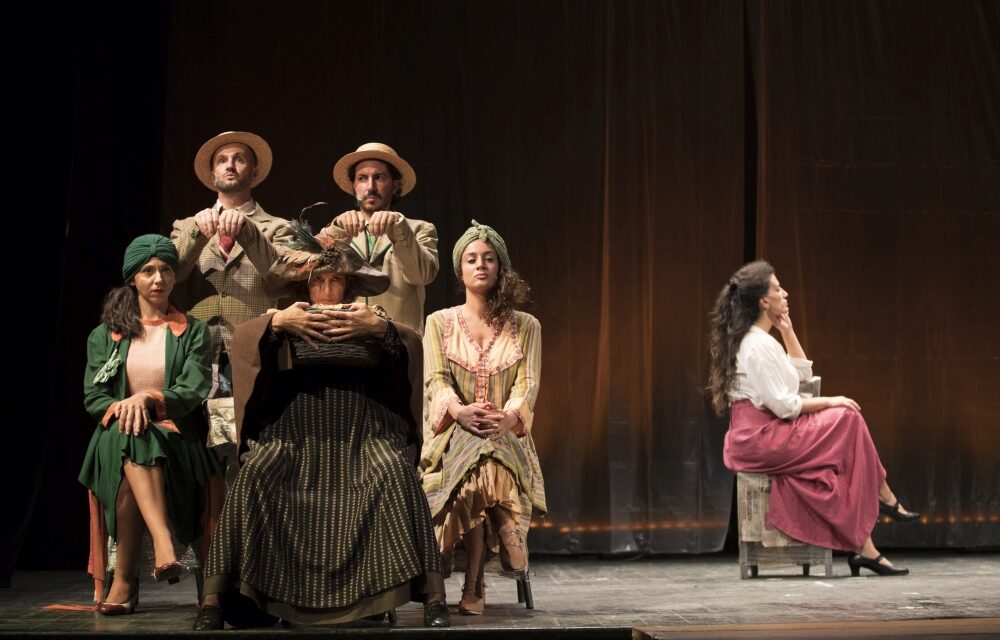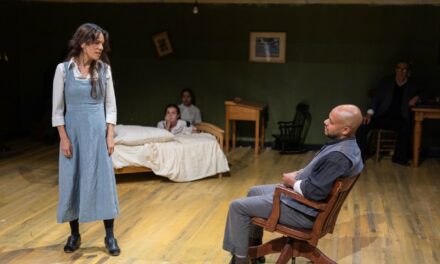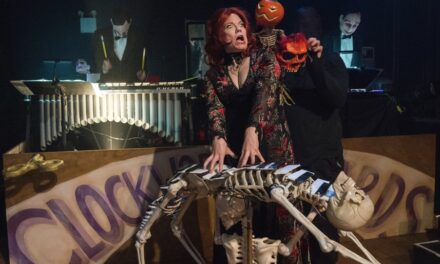The Trianon Viviani Theatre paid homage to the 70th anniversary of the death of the playwright Raffaele Viviani (1888-1950) with a special project, “Viviani on the Road” (“Viviani per strada”), created and directed by the famous actor Nello Mascia. The first part, from 8th to 11th July, 2021, proposed the staging of two one-act plays in Neapolitan: Porta Capuana (an old square with a lively market), and Mmiez’ â Ferrovia (the railway station of Naples). Both written and staged in 1918, these two works are very interesting because they evoke the Spanish epidemic that devastated the world a century ago.
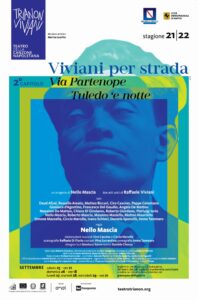
Viviani per strada, poster. Courtesy of the Trianon Viviani Theatre in Naples.
The project had a special attention to the life in the streets and the quarters of Naples, the natural sources of inspiration for Viviani. In fact, he captured the most genuine moods of the people and transferred them into his symbolic and universal theatre, based on the social differences and the struggle for survival of the poor. Thanks to his careful description of the past, we can find many common elements with our present and the pandemic of Covid-19: «These two works, written one hundred years ago – explains Maestro Nello Mascia – have a single protagonist: the choir, the people. The human types, already widely experimented in the variety theatre, are linked in a plot that mixes the drama with a picturesque everyday context. In this way, we have the possibility to think on our past and how time has changed us, aiming to identify elements to face the near future more aware and stronger».
Viviani’s world is made by trivial market sellers, fraudulent fishmongers, hidden lovers and jealousy: emerges a strong feeling of loneliness and anger towards their destiny of poverty, but also a marked self-irony. Passers-by are invited to participate in the Opera dei Pupi and the cinema, in an open confrontation between traditional entertainment and the new form of entertainment.
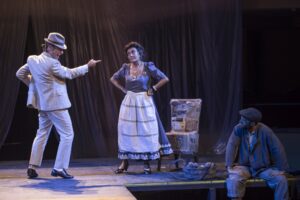
Viviani per strada. Courtesy of the Trianon Viviani Theatre in Naples.
The second part of the project “Viviani on the Road”, from 25th to 29th September, 2021, proposed the staging of other two one-act plays in Neapolitan: Via Partenope (the waterfront of Naples) and Tuledo ‘e notte (Toledo Street at night), both written in 1918.
Also in this works, are evident two frequent themes in Viviani’s theatre: marginalization and misery. Near the Excelsior Hotel, we can see the confrontation between the rich on vacation and a poor urchin (scugnizzo) who does not resign himself to his miserable condition: in fact, he carries out, with strength and courage, his social protest against the wealthy people who stay in the hotel. This peculiarity differentiates the urchin from the other marginalized people of Viviani, who usually have a role of subjection or deep unhappiness. In the description of the nightlife in Toledo Street, there are other typical characters of Viviani: the coachman, the coffee maker, the pizza maker, the prostitute and her customers.
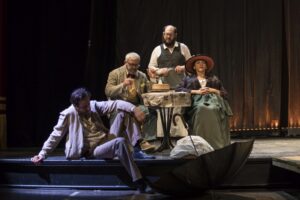
Viviani per strada. Courtesy of the Trianon Viviani Theatre in Naples.
In the early years of his dramaturgical production, Viviani titled many of his works with the names of the streets and squares of Naples where city life took place in a more intense way. The protagonists have many problems of practical nature, explain their difficulties but also their dreams. They were able to share emotions and experiences, with a strong sense of human solidarity.
All the shows had an excellent cast of actors and musicians, with beautiful costumes. The direction of Maestro Nello Mascia is excellent. The scenography cleverly used the stalls and the stage of the Trianon Viviani Theater, recreating the open spaces of Naples with effectiveness and poetic energy. (see also this video in the Trianon Viviani Theater YouTube Channel.
With this important special project, of international value and relevance, the Trianon Viviani Theater has revived life in Naples one hundred years ago without nostalgia: re-evaluating the past means finding new artistic paths for the future.
This post was written by the author in their personal capacity.The opinions expressed in this article are the author’s own and do not reflect the view of The Theatre Times, their staff or collaborators.
This post was written by Maria Pia Pagani.
The views expressed here belong to the author and do not necessarily reflect our views and opinions.

